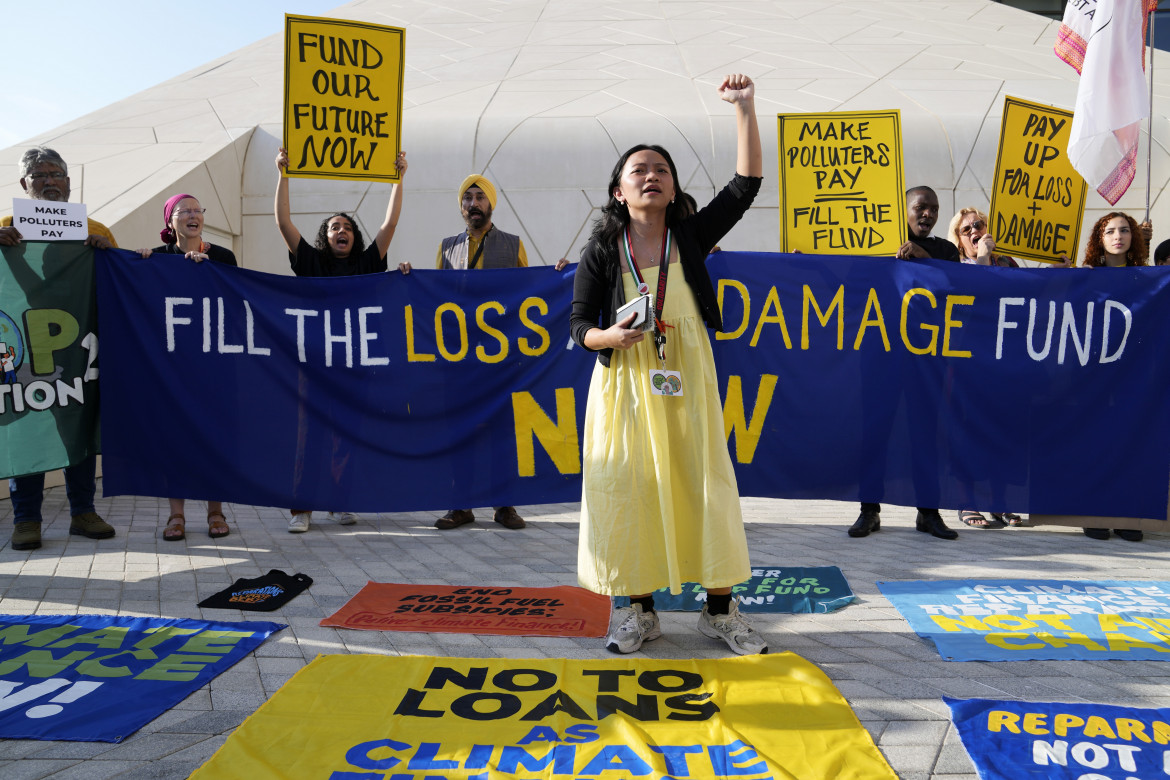Commentary
Who really benefits from climate conferences anyway?
Everything is pro-health, pro-women, pro-children and in the name of equality, but without any sign of a critical approach towards the development model.

The ongoing World Climate Action Summit in Dubai is a valuable opportunity for an archaeology of the present, in which climate politics and economics meld to the point of becoming indistinguishable. The summit’s program gives us a map of the keywords given priority, tying back to the people at the summit and the decisions made. It’s certainly not a new phenomenon, but it’s gradually becoming more and more evident that summits involving global issues are media stages.
They’re not places for actual decision-making, but spaces for staging the presentation of certain choices, the nature of which does not depend on the talks that took place during those scant two weeks. Stages for a global ruling class to act for the benefit of national audiences: voters, as well as allies and adversaries.
Thus, just like on any domestic talk show, Prime Minister Giorgia Meloni’s speech brought out the rhetoric about the “costs of transition,” took a stand against the “ideological” (!) approach to transition, lumped gas together with “clean energy” and praised “technological neutrality.”
The program of the whole summit is full of the mantras of green eco-managerialism, dominated by words like finance, trade, innovation, technology. There’s no sign of more uncomfortable words like capitalism, limits and post-growth. Looking at the panels, entrepreneurs are the new climate heroes: How Entrepreneurs are the Climate Heroes We Need and “global sustainability” dominate the narrative.
Of course, everything is pro-health, pro-women, pro-children and in the name of equality, but without any sign of a critical approach towards the development model. A choice far removed from the daily concerns and priorities of the people for whom the climate crisis requires a profound rethinking of the economic model.
A survey conducted in 34 European countries showed that, on average, 61 percent of respondents were in favor of post-growth. Another survey conducted by the German Environment Agency found that 88 percent of people agreed with the statement “we must find ways to live well regardless of economic growth,” and 77 percent agree with the idea that “there are natural limits to growth, and we have crossed them.” Another poll shows that 81 percent of people in the U.K. believe that the primary goal of governments should be to ensure “maximum happiness” for people rather than “maximum wealth.” Another found that 70 percent of more than 10,000 people surveyed in 29 high- and middle-income countries believed that “overconsumption is endangering our planet and our society.”
Among the climate movements, the most prevalent view of the main cause of the climate crisis is “a system that puts profit before people and the planet.” Finally, the research world is for the most part skeptical about the idea that economic growth can be truly “green” without radical changes in the functioning of the economy. Despite this – or perhaps because of it – the mechanisms of capital accumulation, post-growth scenarios and the crisis of nature’s metabolic cycles induced by financial capitalism are the great absentees in Dubai, on whose stage the public personas of the world’s political class are performing.
During the second day of the conference, the organizers published a list of all the names and places of employment of the participants in the summit. The Heated website examined the data and uncovered hundreds of fossil fuel industry representatives, actively working to delay the adoption of measures against “global boiling.”
More than 20 countries have signed a declaration to recognize nuclear power’s positive role in climate action, committing to tripling it by 2050 and including it in climate finance loans. Among them are the U.S., U.K., France, South Korea, and, of course, the Emirates. At the same time, the “loss and damage” fund, formally created a year ago to compensate for climate disasters occurring in the most vulnerable countries, has been made operational and the first funding is coming in, inaugurated by the Emirates’ $100 million, followed by Germany, the U.K. and Japan.
The reasons for moving forward with the fund are political, as Ferdinando Cotugno writes on X (formerly Twitter): Al Jaber needed a win to obscure his conflicts of interest at COP28, and he identified the fund as the way to reach that goal. Which three countries were the most generous with their funding? Italy, Germany and France, three countries which over the past year have struck billions of dollars in gas and oil deals with Al Jaber himself, in his role as CEO of ADNOC. Meanwhile, on the same day that November 2023 officially becomes the hottest November on record, beating the previous record set in 2020 by 0.3°C, Al Jaber declared that there was no scientific data to support the need to get off fossil fuels altogether.
As for the climate, once again, it can wait.
Originally published at https://ilmanifesto.it/ma-a-chi-servono-davvero-le-conferenza-sul-clima on 2023-12-05
